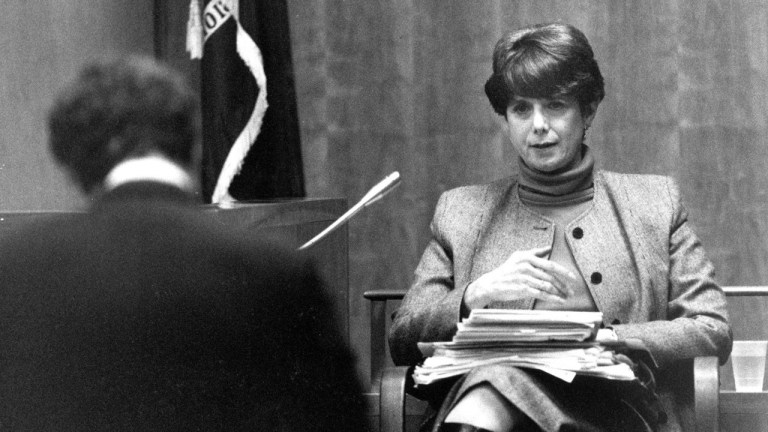Crazy, Not Insane Doc Studies Serial Killers’ Minds on HBO
Alex Gibney’s upcoming documentary Crazy, Not Insane, explores the deep work of a controversial mental health advocate.

Psychiatrist Dr. Dorothy Otnow Lewis is an influential and controversial figure. She interviewed Ted Bundy four times in 1986 at the request of the defense. Dr. Lewis pioneered psychiatric legal avenues by exploring trauma as root causes of horrific crimes in many cases. HBO’s upcoming Crazy, Not Insane will explore Dr. Lewis’ “lifelong attempts to look beyond the grisly details of homicides into the hearts and minds of the killers themselves,” according to the advance press. The documentary debuts Wednesday, Nov. 18 at 9 pm.
Directed and produced by Oscar-winner Alex Gibney (The Inventor: Out For Blood in Silicon Valley, HBO’s Agents of Chaos), Crazy, Not Insane seeks to challenge “the very notion of evil and proposing that murderers are made not born,” according to the press statement. The documentary, which includes videotaped death row interviews, examines formative experiences and neurological dysfunction as contributing factors in crimes of serial killers such as Bundy and Arthur Shawcross.
The videotapes of her interviews reveal the way the killers she examined would switch between alternate personalities, which she calls “alters.” The death row interviews show “meaningful transformations between ‘alters’ developed in childhood, often as a way to endure and sometimes avenge the pain they suffered,” according to the press statement.
Shawcross was convicted in 1991 for the murder of 11 women. Lewis’ videotaped interviews show Shawcross inhabiting alters of his vengeful mother and a 13th century cannibal. Shawcross was found sane and guilty in a trial by jury. Taped just before execution, the audiotape of Dr. Lewis’ death row interview with Ted Bundy questions conventional wisdom about him. Lewis states that she regrets never getting the chance to examine Bundy’s brain for further clues into his dark psyche.
Dr. Lewis, who wrote the 1999 book Guilty by Reason of Insanity: Inside the Minds of Killers, began her career working with children including violent juvenile offenders. Their testimony about childhood physical and sexual abuse led her to explore how childhood trauma, coupled with neurological damage, can “sow the seeds of murderous impulses in adults,” according to the statement. The work led her to become an expert in dissociative identity disorder (DID), formerly known as multiple personality disorder.
Laura Dern (The Tale, HBO’s Big Little Lies) voices the doctor and author’s literary voice. Dr. Lewis testified in death penalty cases about whether convicted murderers were sane enough to be executed. Her work sparked controversy in both legal and psychiatric circles. Her conclusions were challenged by experts, including well-known forensic psychiatrist Park Dietz. But her insights and forensic skills helped change the laws and the way that death penalty lawyers approach their clients’ cases.
The title Crazy, Not Insane refers to the conflict the legal system has with medical science in defining grave mental illness. Gibney uses a mixture of cinema verité, videotapes of psychiatric evaluations, hand-drawn animation, and home movies in order to explore the complexities of the human mind. The film includes a videotape of Dr. Lewis’ interview with “traveling executioner” Sam Jones. The electrician, who administered hundreds of death penalty sentences, claimed he had no regret for the “convicted killers” he “zapped” in the electric chair. Dr. Lewis found he was hiding great inner turmoil, which came out in the paintings he made after every execution.
Dr. Lewis also conducted interviews with John Lennon’s assassin, Mark David Chapman, as well as David Wilson, Marie Moore, and Joseph Paul Franklin.
Crazy, Not Insane also explores the death penalty. The film questions the theory that the death penalty is a deterrent to violence, and finds states with the death penalty tend to have higher murder rates than those without.
Crazy, Not Insane debuts Wednesday, Nov. 18 at 9 pm on HBO.
